When life gets busy and my attention dwindles (both of which were true for me in the past month), I find myself leaning into nonfiction and shorter novels. That is reflected in this month’s book reviews; as you’ll see, I had mixed success. Let’s dive right into the reviews.
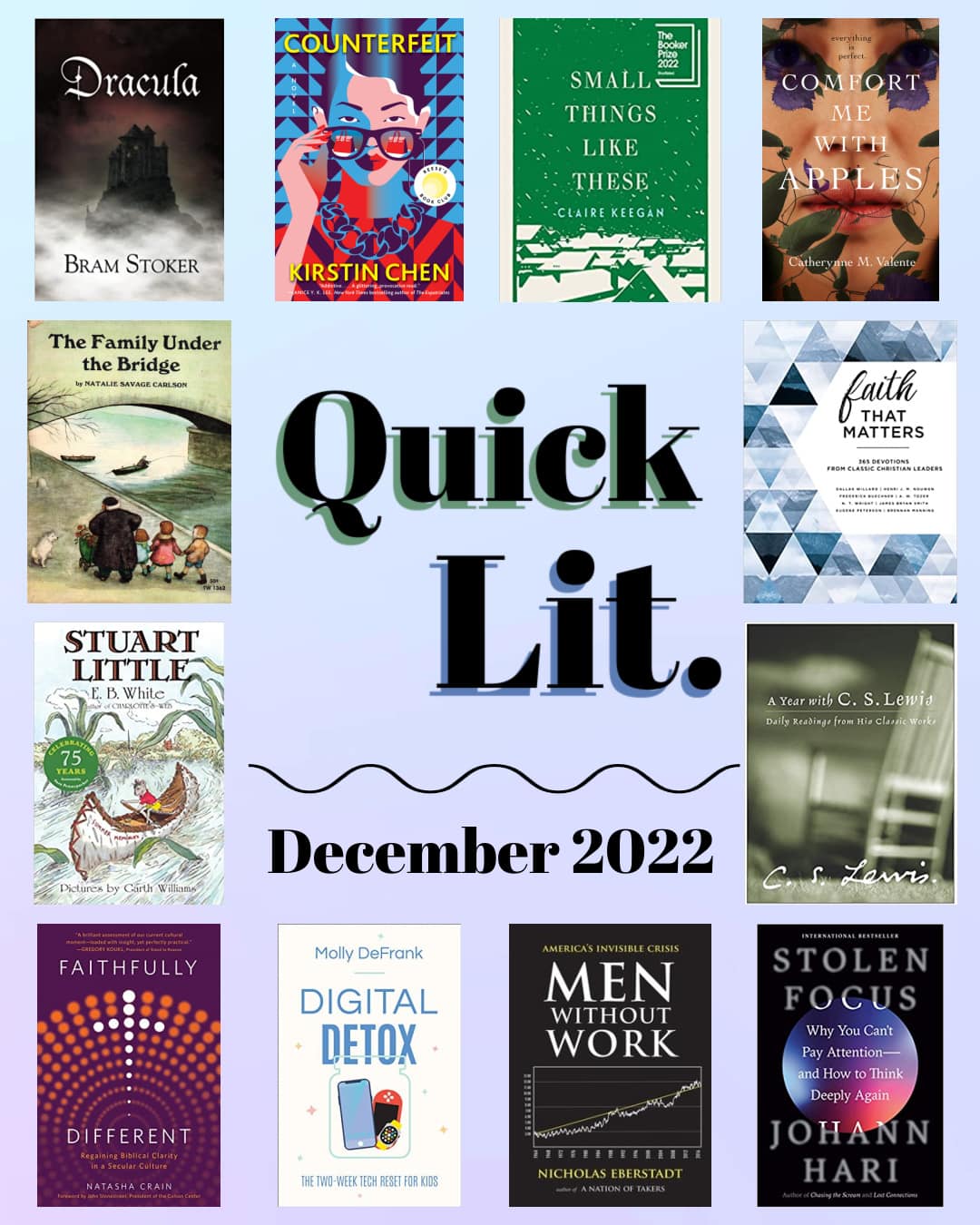
FICTION
Dracula, by Bram Stoker: This was a classic I never read in school, and honestly had no desire to read. But when my friend told me about Dracula Daily—an email newsletter sharing parts of the book on the dates when they happen in the story—I decided to follow along. The newsletter format makes sense for this book, as it’s an epistolary novel told through letters, diary entries, and newspaper clippings dating from May 3 through November 10. The emails made for a convenient slow-but-steady read, but since I prefer reading on my Kindle, I ended up downloading the full book and following along in my own version (using the newsletter as a daily reminder to keep with the dates and pace).
First of all, I will say that I would not recommend reading this in a day-by-day format like I did. Though it’s a creative reading plan, I found myself forgetting too many details between readings. The story is pretty difficult to follow, and spacing out each chapter made this harder. Another frustration was that I wasn’t loving the book; I just wanted to power through to the end so I could call it done!
As for the story itself, it’s not what I expected: the voice and structure are intriguing (the book is told from several points of view). but the prose is overwrought. And the story is much more gruesome and graphic than I had imagined! It is genuinely a horror novel and seriously creeped me out at times.
For those not familiar with the premise (I wasn’t), Dracula begins with a solicitor named Jonathan Harker traveling to a Transylvanian castle to stay with a nobleman named Count Dracula, whom he soon discovers is a vampire. When the Count moves to England and begins preying upon its citizens, Harker and a unique band of friends unite to hunt Dracula and bring an end to his reign of terror.
I knew little about vampires before reading this, so the theory/science behind these creatures was interesting to me. I was also fascinated by the examination of supernatural vs rationalism vs faith, and how topics prevalent at the time of writing (late nineteenth century) play into the narrative. I read a commentary alongside the book to help me identify and explore these themes, and this enhanced my reading experience a great deal.
I am glad to have read this, and glad I can now definitively say that it wasn’t for me thanks to the weird mix of too scary and too dry. I can see why some may love it, though; as I was reading I shared portions with Luke and he is eager to give the book a try!
My Rating: 3 Stars // Book Format: Kindle

Counterfeit, by Kristin Chen: After a lifetime of playing by the rules, Ava Wong is floundering: she has left the successful law career (which she initially only took to please her Chinese-American parents), her doctor husband is more committed to his work than his family, and her toddler son is proving more than she can handle. When Ava’s college friend Winnie reenters her life unexpectedly, Ava becomes an easy recruit for Winnie’s latest scheme involving the import and substitution of luxury handbag replicas. Winnie is in need of a partner and Ava becomes her reluctant coconspirator. But when the duo’s scheme is uncovered, Winnie vanishes and Ava is left to pay for her crimes.
Ava’s story, told in the form of a police confessional, is an example of the American dream going wildly wrong when a “model minority” attempts to subvert expectations. . . and fails. It is a feminist con-artist tale of toxic friendship and desperate greed, with passages that ooze wealth, luxury, and subterfuge.
I was expecting a mystery or thriller from this, and that is not quite what this is. There are some mysterious elements (namely an unreliable narrator), but it is more societal commentary than thrilling caper. I appreciated the window into Asian-American culture and was fascinated (though slightly appalled) by the world of high-end fashion. There are some excellent insights into the life of a working woman turned SAHM (and all the grief/challenge/hopelessness/pressure that can entail) as well as the world of socialite preschools, not to mention all that I learned about designer handbags—how they are made, and what a status symbol they can be (I had no idea!). The illegal dealings in the book also prompt some thought-provoking ethical questions regarding the various types of crime and how they should be viewed.
While the book has a lot to commend it, I strongly disliked the protagonists which made it a hard book to love. I also grew annoyed by the narrator’s voice: the confessional, with periodic asides made to the interviewing detective (who remains off the page) was tedious. We are eventually given a second point of view, which I liked much more and which served as an excellent counterbalance to the primary narrative, but this came in a little too late.
This is a highly discussable book club pick, and I think it might be a great vacation read that strikes the right balance of propulsive but not too tough to set aside as needed.
My Rating: 3.5 Stars (Rounded up to 4 Stars on Goodreads) // Book Format: Print
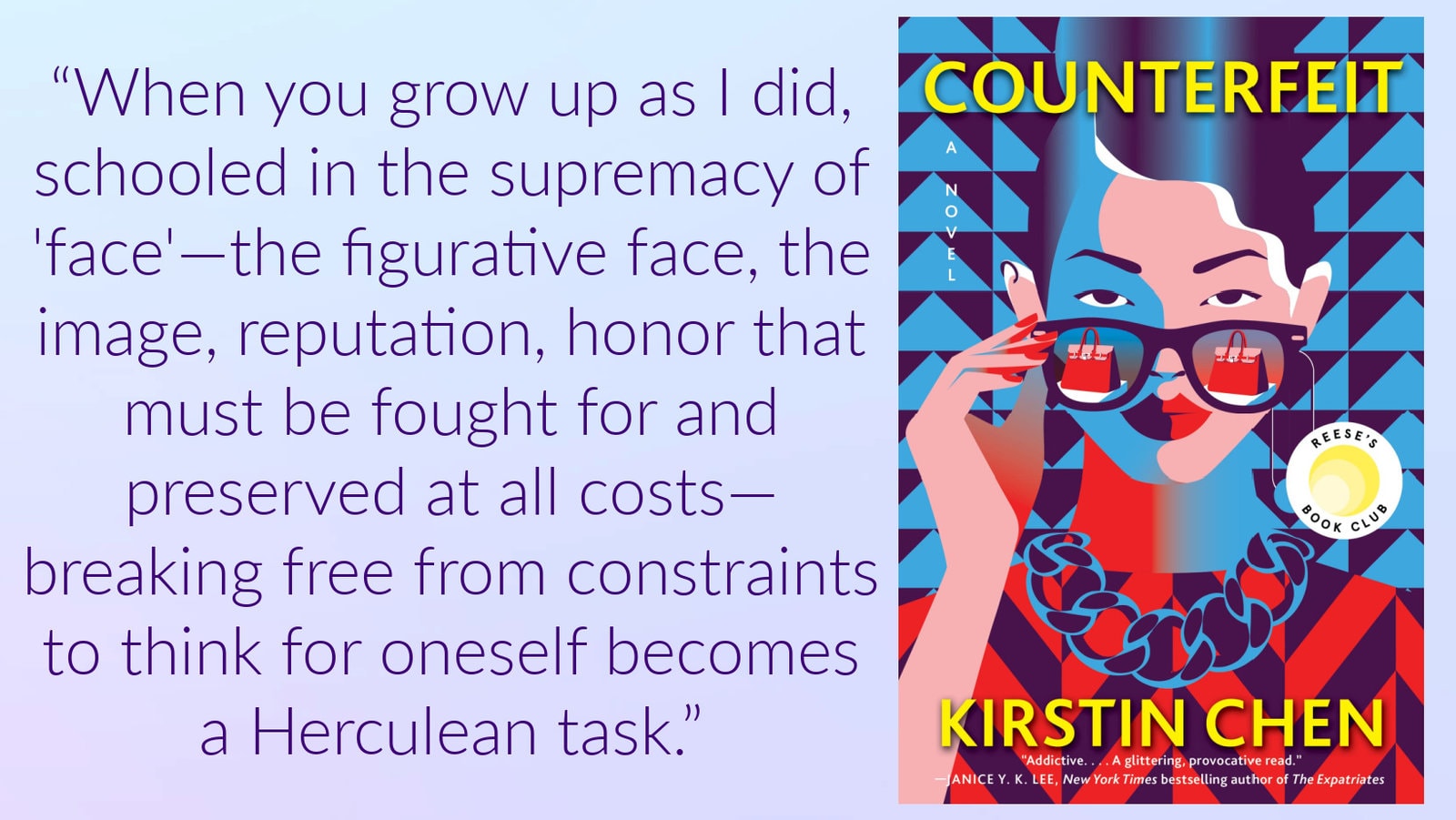
Small Things Like These, by Claire Keegan: In a small Irish town, in the weeks leading up to Christmas of 1985, Bill Furlong is a hardworking coal merchant and devoted father to five young girls. As the Furlong women join the town in preparing for the winter festivities, Furlong outwardly joins in the Christmas preparations while inwardly processing through a sense of restlessness and felt lack of purpose. His internal struggles take a sharp turn when Furlong stumbles upon a heartbreaking revelation while making a delivery at the local convent. In an instant, Furlong’s eyes are opened to a corruption of justice lurking beneath the town’s congenial surface, leaving him with some uncomfortable decisions to make about if and how to confront the nearly impenetrable powers and corruptions of the church.
Clocking in at just over 100 pages, this is a brief novel that can be consumed in an hour but should be savored and possibly reread a time or two—it is that beautiful, and also that powerful. With hypnotic prose and razor sharp insight into issues of corruption, complicity, and human complexity, Keegan shares an inspiring and life-affirming Christmas tale of courage, compassion, and community. Reminiscent of It’s a Wonderful Life, this is a seasonal story with a strong sense of place but universal message.
I knew nothing of Ireland’s Magdalene Laundries before reading this book, and was intrigued (though also horrified) by this topic. The book also exposed me to several new Irish words and phrases. I’m looking forward threading more of Claire Keegan’s work in the future; I hope her other novels are equally mesmerizing and memorable as this.
My Rating: 5 Stars // Book Format: Print
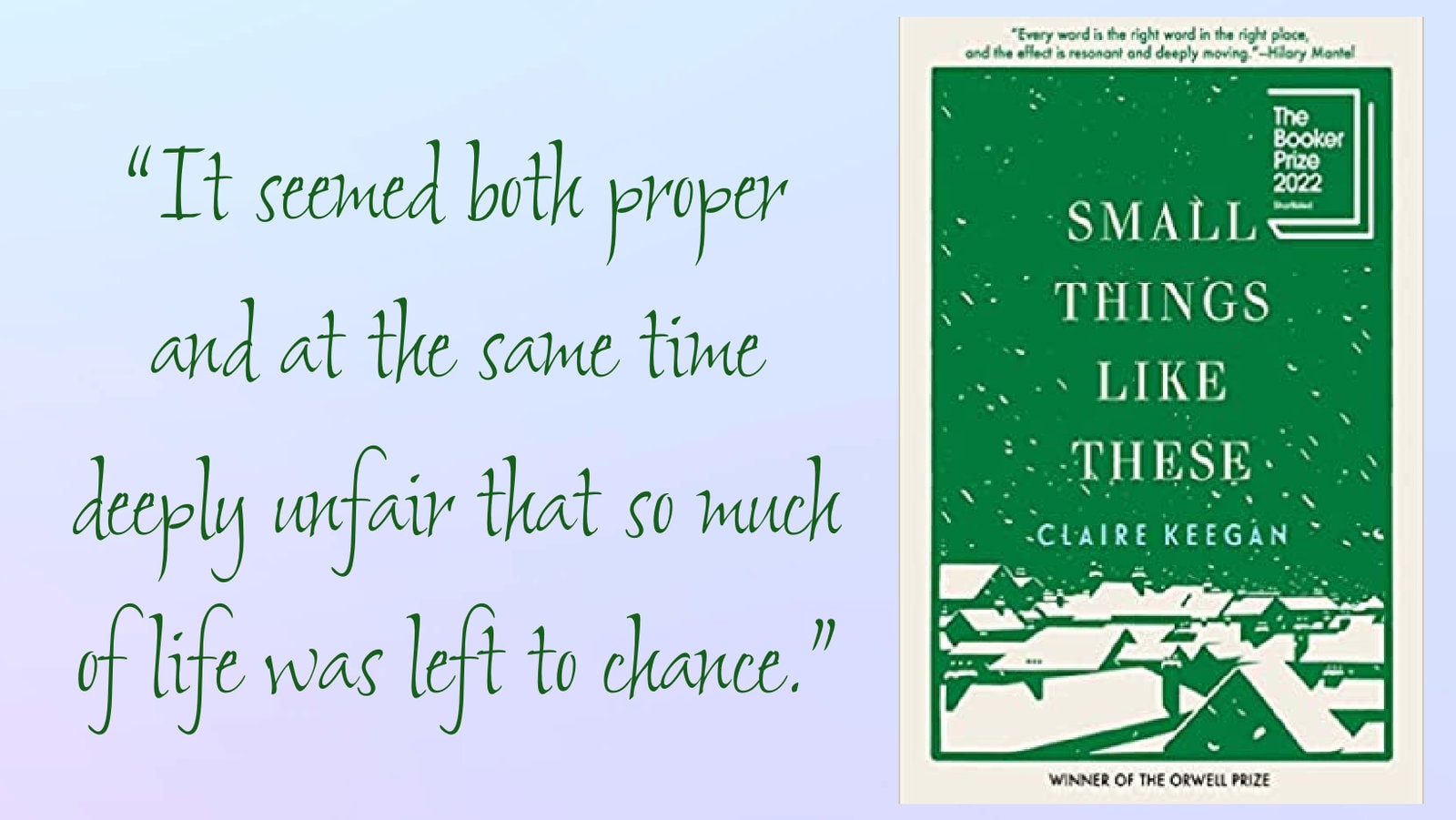
Comfort Me With Apples, by Catherynne M. Valente: “I was made for him. It is morning, which is to say, it is the beginning of all things. It is bright and it is sharp and it is perfect and so is Sophia, who wakes alone to this singular thought, as she does every morning.” So it begins for Sophia, a perfect woman living a perfect life, married to a perfect husband in a world where everything is exactly as it should be. . . .
But everything is NOT exactly as it seems. Soon Sophia begins to question, to wonder, to doubt: is this man for whom she was made really the idyllic husband she has always thought him to be? What is it that her pristine home and her too-kind neighbors are trying to tell her? Soon her fairytale existence devolves into something dark and sinister and viscerally horrible.
It’s tricky to discuss this novella without giving anything away. I first learned about it on the Currently Reading podcast, and the cohosts’ effusive praise for this “mind-blowing” story had me racing to the library to read it for myself. From the earliest pages I had an idea what this allegory was all about, and I was not wrong, though it takes some frightening turns I did not foresee. By the end I could understand why it was described as dark fairytale horror because it is very much all of these things.
I have to credit Valente for her creative take on a familiar story; the feminist spin was too pointed for me, and the grotesque elements were difficult to stomach. But the prose is amazing: vivid and sharp, carnal and at once tantalizing and off-putting, with descriptive passages that lured me in even as they made my stomach churn. Valente’s metaphors are layered and possible interpretations are numerous; the book is short (just over one hundred pages), but it absolutely packs a punch and provides much fodder for book clubs.
I do feel that the fairytale misses the point of the original story entirely, and I was uncomfortable with some of the theological points the author seems to be making and the conclusions she hints at. But for better or worse, this is a story I will not soon forget.
My Rating: 2.75 Stars // Book Format: Print
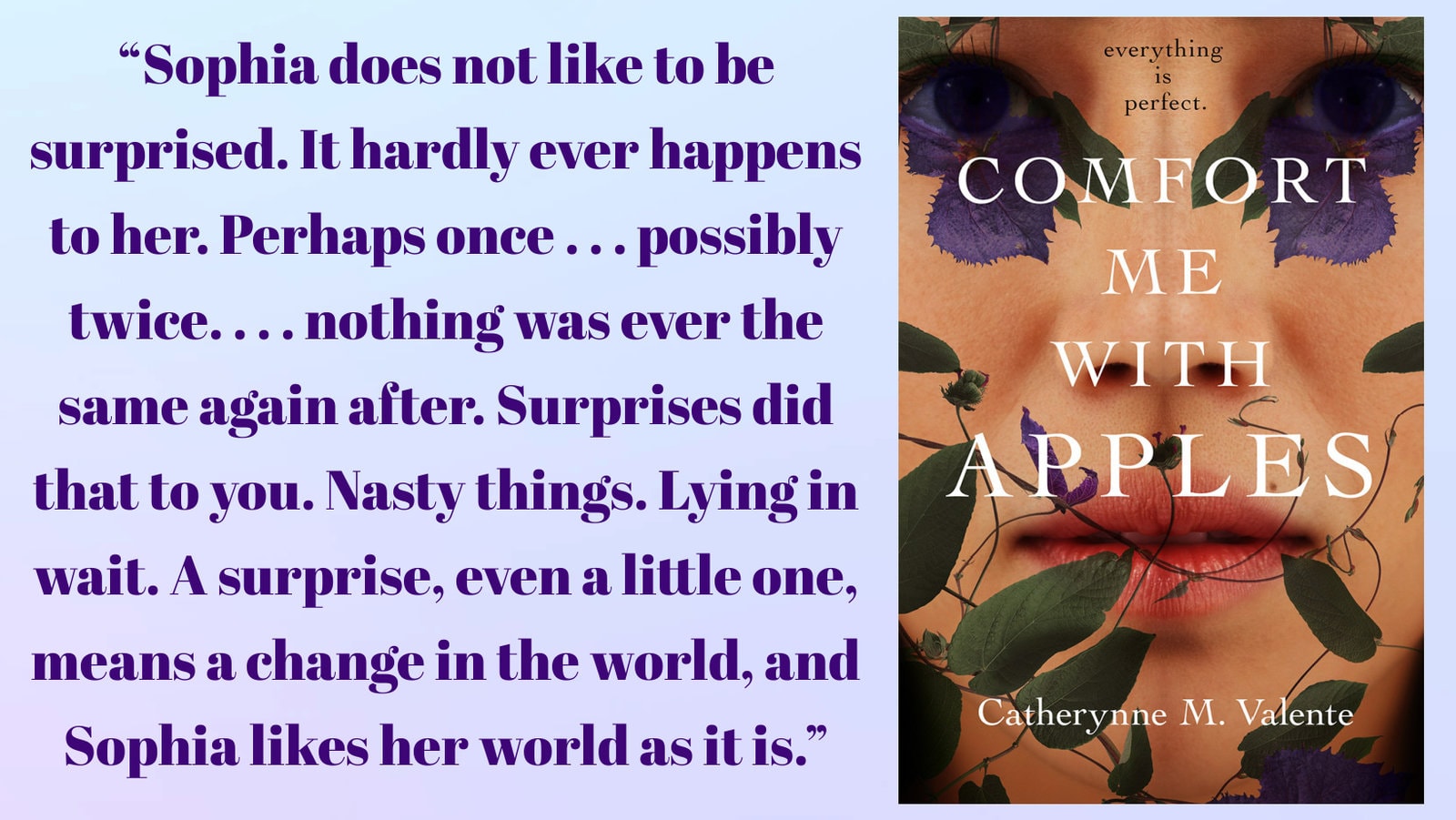
MIDDLE GRADE READ-ALOUDS
The Family Under the Bridge, by Natalie Savage Carlson: This book was a part of Charleston’s first grade curriculum through Sonlight this past spring, but we saved it to read this December when I realized it was a Christmas book. The novel tells the story of a curmudgeonly Parisian hobo named Armand. When a mother and her three young children find themselves homeless, Armand reluctantly agrees to make space for the family under the bridge he calls home; before he knows it, the children have worked their way into more than just Armand’s space, but his heart as well.
This endearing story of found family is emotionally complex, yet heartwarming, and I appreciated the themes of kindness, ingenuity, courage, altruism, and loyalty. But though I liked the idea of the story (especially the emphasis on generosity, a nice contrast to the materialistic themes of many holiday stories), I did not care for the writing style or the neat ending that was far too tidy, even for a children’s novel. (Although I have to say that Charleston, who is a sucker for a happy ending, happened to love it.)
Published in 1958, this book features many elements that don’t align with modern sensibilities—from the terminology and ideas around homelessness, to the portrayal of gypsies, and even dynamics between strangers. I welcomed the opportunity to read about (and introduce Charleston to) these older ways of thinking, but families may want to be aware of these themes and topics ahead of time.
My Rating: 3.5 Stars (Rounded down to 3 stars on Goodreads) // Charleston’s Rating: 4.75 Stars // Book Format: Print
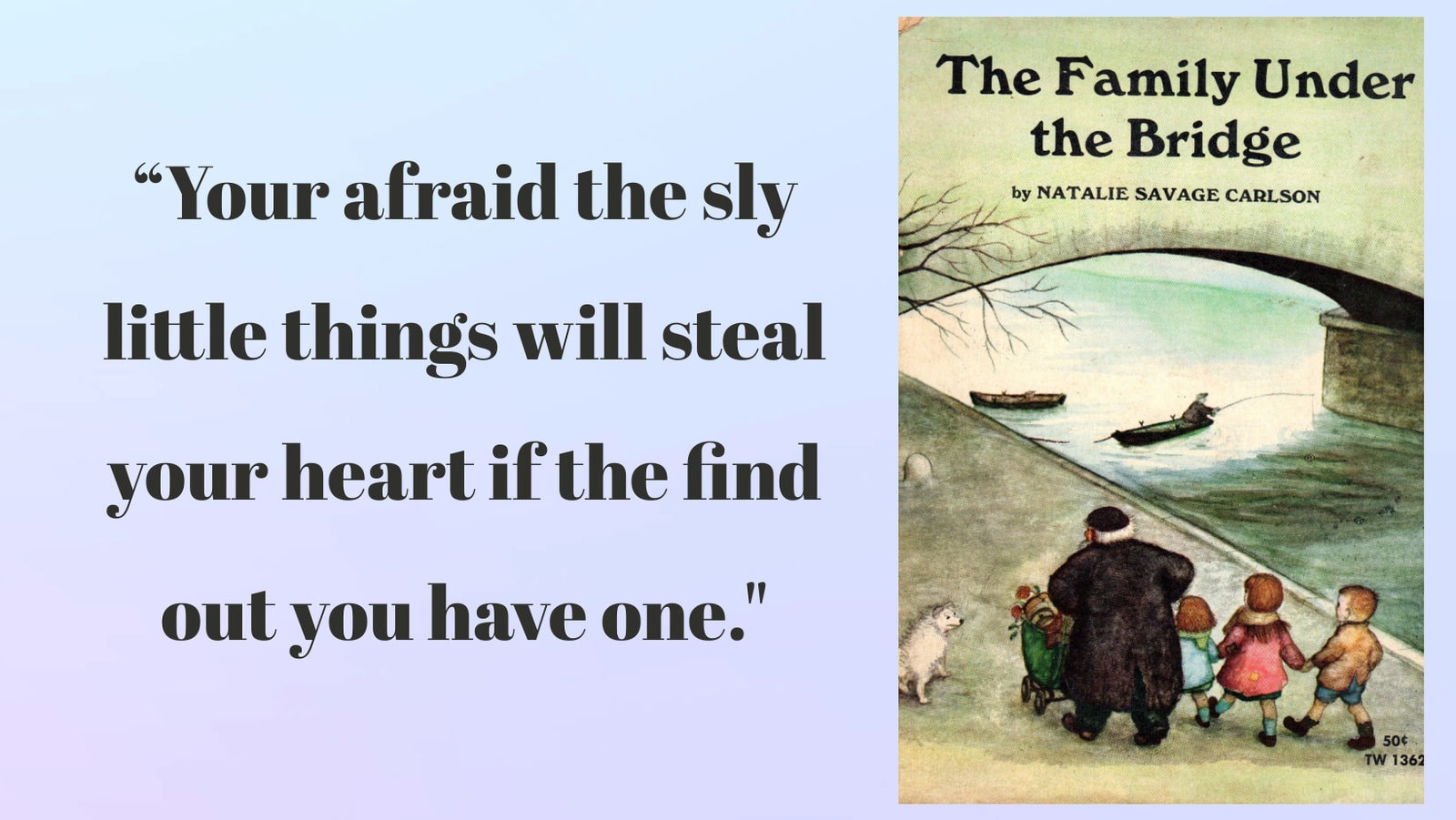
Stuart Little, by E.B. White: Charleston and I both loved our reading of Charlotte’s Web so much that when he requested we choose another of E.B. White’s books as our next read-aloud, it was an easy YES! Though this book has been on my radar since my own school years, I somehow had never read it. It tells the story of Stuart, who gave his parents the surprise of their lives when he was born into their family—because they are all human and he is a mouse! And a rather dapper and precocious mouse at that! Stuart’s size and appearance present many challenges for the Little family, but they make necessary accommodations, and by the time Stuart is seven years old he is independent, conscientious, kind-hearted, and adventurous.
When Stuart’s best friend, a songbird named Magalo, is forced to flee after the the Littles’ pet cat, Snowbell, determines to eat her, Stuart sets off after the bird. Stuart’s adventure sees him borrowing an invisible car, becoming a substitute teacher for a small-town classroom, and courting a teenager girl who happens to be just Stuart’s size.
I adored the character of Stuart and appreciated the honorable character attributes he exhibits of loyalty, persistence, resilience, courage, resourcefulness, curiosity, and kindness. Stuart and his adventures set the stage for some great book chats with Charleston, and the story itself offered plenty of laughs. I was surprised by (and didn’t love) the odd blend of fantasy and realism: like Charlotte’s Web, this is a very realistic story with just one aspect (in this case, Stuart’s mouse-ness) being fantastical. I can’t quite name why this worked so well for me in Charlotte’s Web and not here; it wasn’t an issue for Charleston (or for millions of other Stuart Little fans over the years, obviously!) so it might just have been a matter of mood while reading.
Other aspects of the novel I didn’t love were the inconclusive ending and the strange shift that occurs mid-book from family story to adventure tale; it almost felt as though this should have been two separate novels entirely. For his part, Charleston hated the cliffhanger end and cried about the lack of resolution. (He solved this by writing his own ending and taping it to the back of our copy of the book.)
While this didn’t have the same charm as Charlotte’s Web, there is no denying that Stuart Little is a sweet story with some lovely themes of family, friendship, and learning to make one’s way in the world. I’m glad Charleston and I got to savor this classic together, even if it wasn’t a read-aloud favorite.
My Book Rating: 4 Stars // Charleston’s Rating: 3.5 Stars // Book Format: Print
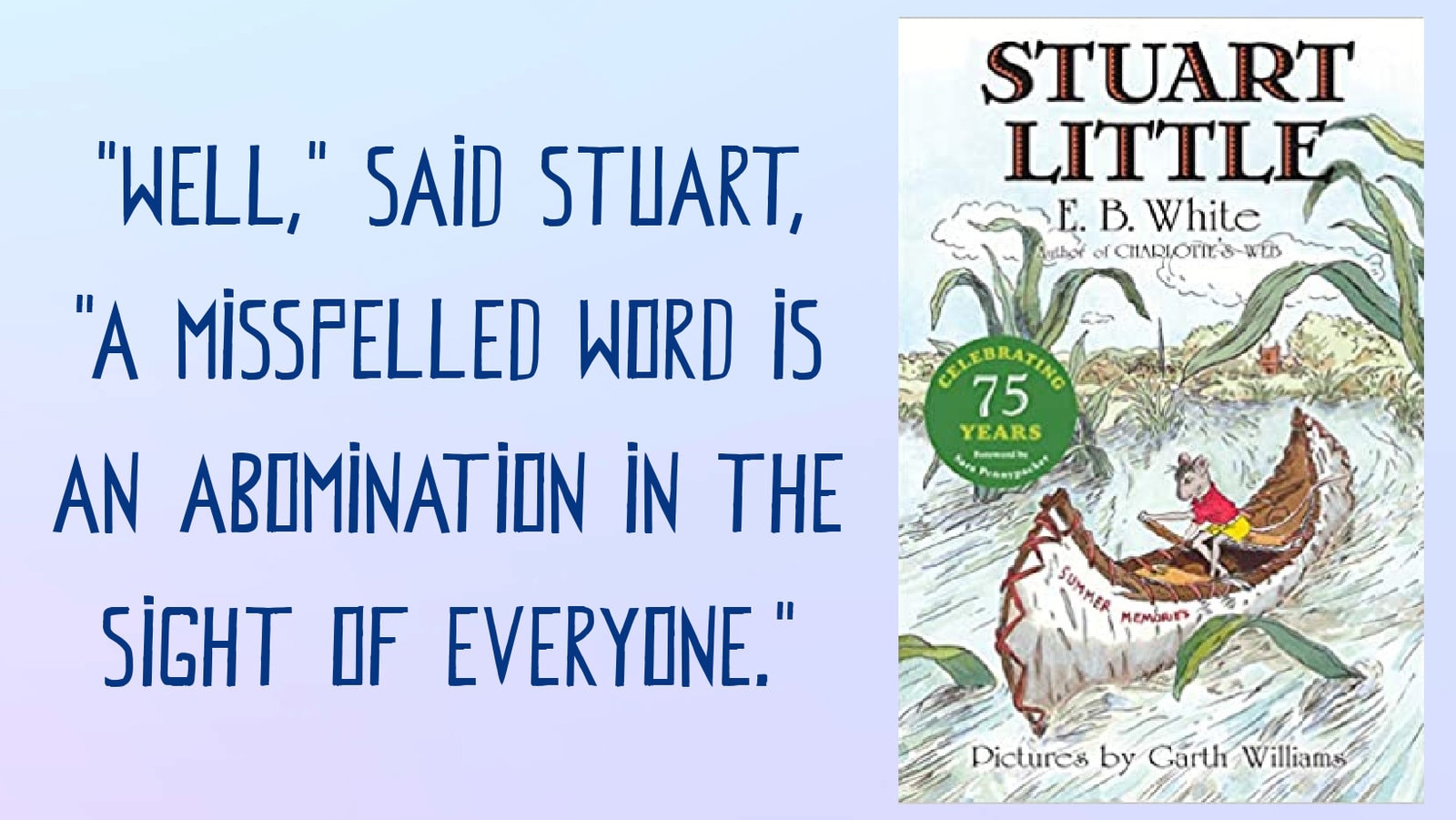
NONFICTION
Faithfully Different: Regaining Biblical Clarity in a Secular Culture, by Natasha Crain: As a Christian, I understand that my views and beliefs won’t always align with those of the world. The distance between these worldviews seems to be expanding more rapidly than ever, and I’ve found myself wanting/needing to get a clearer understanding of my own beliefs and why I believe them. This pursuit has led me to several amazing apologists and theologians speaking up on these issues, and I’m devouring their podcasts and books; this was the most recent.
Natasha Crain is a mom to three whose ministry has centered around equipping Christian parents to raise their kids with a Biblical understanding and ability to defend their faith in a secular world. Faithfully Different is her first book written for all adults, not just parents. In it, Crain puts forth a model for living out our faith with conviction, discernment, and courage. She begins with a deep dive into the numbers, looking at studies showing how few Americans (less than ten percent) hold to a Biblical world view (agreeing in the existence of absolute truth and the reality of Satan, attesting that the Bible is totally accurate, and affirming that Jesus lived a sinless life, that a person cannot earn their way to heaven by doing good works, and that God is the creator of the universe). She then identifies the four pillars of secular culture —1) Feelings are the ultimate guide; 2) happiness is the ultimate goal; 3) judging is the ultimate sin; and 4) God is the ultimate guess—and shows how these are misaligned from Christian beliefs. She also explains why so many have fallen for secularist ideology: Crain has a background in business and marketing, and this expertise is evident as she explains the more practical reasons for how secularism has taken root and what makes it so “marketable”.
A majority of the book is dedicated to explanations of how we can believe, think, and act differently from mainstream culture. Within these chapters she explains a Biblical approach to issues such as deconversionism, virtue signaling, cancel culture, social justice, and secular relativism—all of those hot button issues that most Christians are afraid to touch! These discussions are logical and Scripture-based but also compassionate; there is no mocking of other belief systems, but there IS a clear-eyed defense of an alternative, God-centric perspective. There was not a single chapter that didn’t speak to an issue I’ve not known how to handle, but the final chapter on how to share the Gospel under the pressure of relativism was probably the most helpful for me.
Natasha Crain states up front that this book is written for those who believe the Bible is God’s Word, without error and the only sufficient and authoritative voice for salvation, faith and godliness. Those who do not hold these views will certainly learn a lot from this book, but it was not written with that audience in mind but rather for Bible-believing Christians seeking guidance in identifying worldview pressures and defending our faith against misguided influences. As someone firmly within this demographic I found this book to be an outstanding resource. I’m not new to the world of apologetics, but this one felt more relevant and applicable than many I’ve read thanks to its unpacking of specific secular pressures and clearly defined understanding of both Biblical and secular world views. I listened through this one time, then started right back again for a second listen while following along in the eBook because I didn’t want to miss a thing.
My Rating: 5 Stars // Book Format: Audiobook
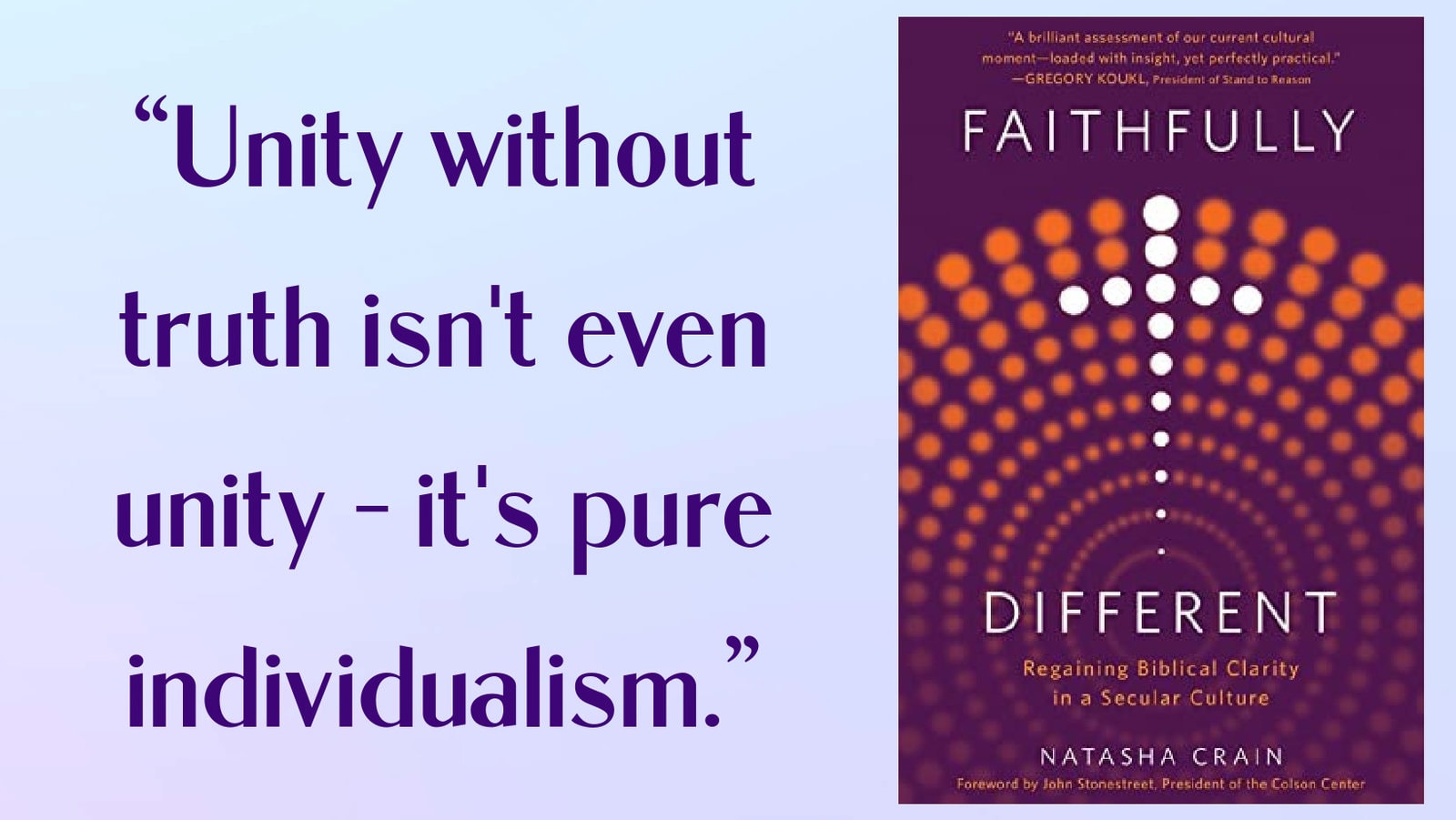
Digital Detox: The Two-Week Tech Detox for Kids, by Molly DeFrank: I jokingly refer to myself as our family’s resident Screen Time Nazi. (As I write this, I’m realizing that is likely an incredibly offensive term. . . now welcoming suggestions for an alternative title!) We do not forbid all screens in our household, but our kids’ access to them is extremely limited. This level of regulation is an anomaly among my friend group, so my ears perked up when I heard Molly DeFrank on a podcast recently: here was a kindred spirit who had recognized the detriments of screen time for her kids and decided to make some changes. Though I wasn’t necessarily in need of DeFrank’s book (much of which I could have written myself!), I wanted to give it a listen as I hoped it might provide the motivation I needed to be more consistent with our family’s screen rules.
In Digital Detox, Moly DeFrank (a stay-at-home mom/foster mom to six kids) shares of the meltdowns, frustrations, and aha moments that led her to make some changes with her family’s approach to technology. After noticing the detrimental effects of excess screen time on her kids’ behavior, sleep, imaginations, attention spans, and more, she and her husband decided to try an experiment: they would take away ALL screens for two weeks and see what might happen. The experiment was a success, and in Digital Detox, DeFrank guides parents in implementing their own family detox through four simple UNDO steps (Unplug cold turkey; Notice your kids’ interest/talents/opportunities for growth; Develop a list of screen fun together; and Open the books). Then, in Part Two, DeFrank provides ideas for creating a long-term tech plan once the detox is over, as well as answers to other questions that might arise regarding sustaining the results (such as how to approach tech and learning, ideas for a parent tech detox, suggestions for getting other family members on board, and more).
This is much more of a HOW book than a WHY book; parents not noticing a problem with their kids’ screen usage likely won’t find that motivation here (though if you’re looking for that, check out Stolen Focus, reviewed below). But for families who are already eager to make some changes and in need of tips, this is an invaluable resource. DeFrank not only puts forth an inspiring example to emulate, she also offers countless tips, suggestions, and other considerations to keep in mind. I appreciate that she doesn’t simply guide parents in STOPPING technology; she also offers advice on how to best fill all that extra time. I especially loved the chapters on using the time away from screens to study our kids’ and identify their strengths and passions, as well as the chapters on replacing screens with books (with lots of great book recommendations).
While I don’t feel the need for a full Detox for our own family, I did come away from this book with some great takeaways for integrating moderate tech in healthy ways. This book also left me feeling encouraged in our decision to moderate our family’s tech usage; we are undeniably going against the norm with this approach, and I like knowing we are not alone.
My Rating: 4 Stars // Book Format: Audiobook

Men Without Work: America’s Invisible Crisis, by Nicholas Eberstadt: After hearing Megyn Kelly interview Nicholas Eberstadt about the phenomenon of declining men in the US workforce, I was eager to read his book. In it, Eberstadt shows that despite declines in official unemployment records, America’s work rate has steadily declined over the past half a century, with the work rate for men between the ages of 25 and 54 even lower than in the Great Depression prior to World War II. As of 2016 (when the book was published), nearly one in six American men of working age was not engaged in paid work. This number seems startlingly high, but Eberstadt offers an extensive analysis of the issue, using detailed statistics to make his case.
While it’s difficult to argue with Eberstadt’s findings (and I have no doubt the numbers are statistically higher post-Covid), the author does little to explain the phenomenon; he is simply informing readers of its existence, without attempting to show how or why this has happened. He also proposes few solutions for how to shift this trajectory. (These same critiques are made in the opposing views offered by other researchers in the book’s final chapters.) This is certainly a phenomenon deserving of societal attention, but this book offered both too much (raw data) and too little (by way of explanation and answers) on the topic.
My Rating: 3 Stars // Book Format: Audiobook
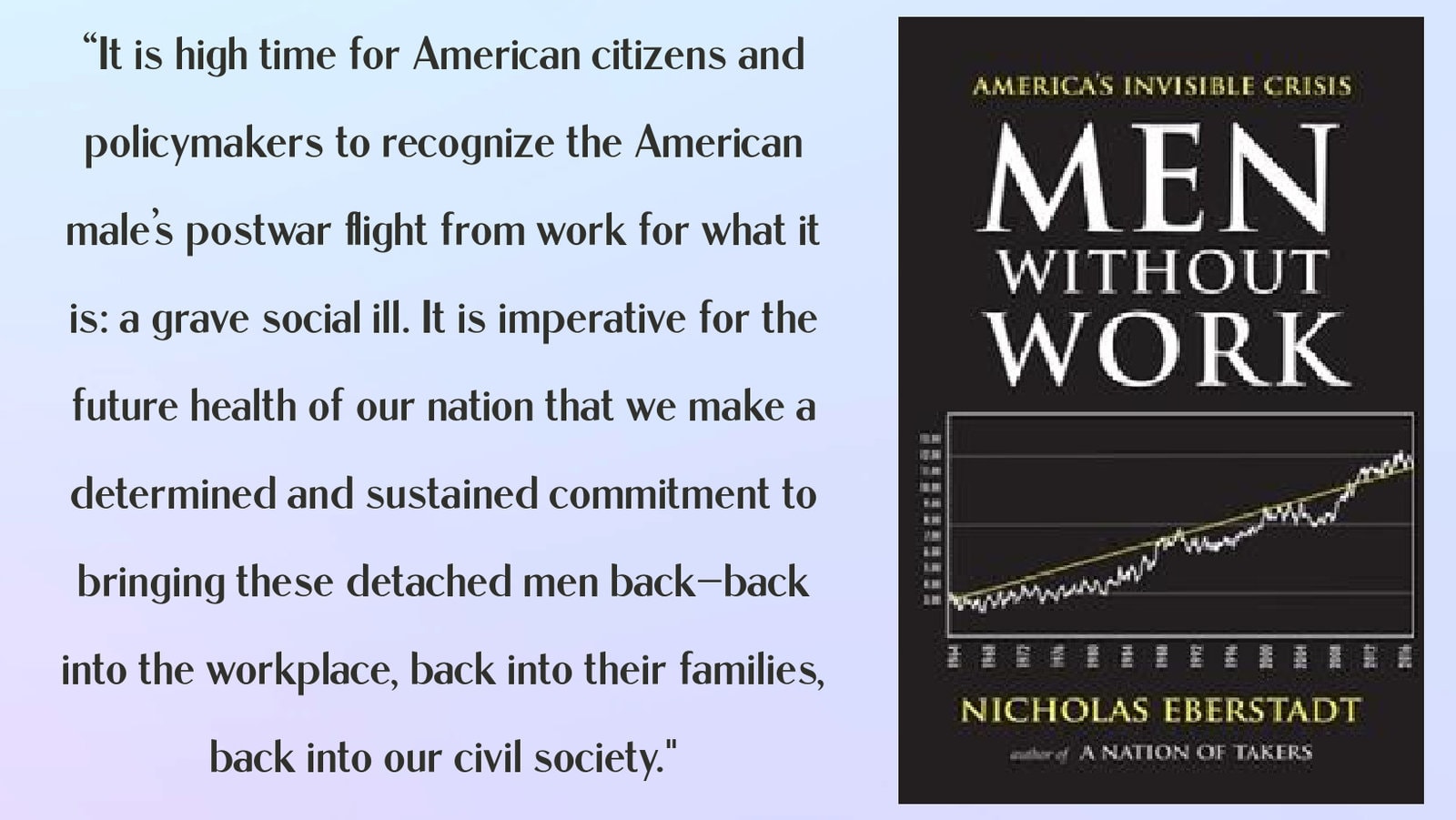
Stolen Focus: Why You Can’t Pay Attention (and How to Think Deeply Again), by Johann Hari: We all can sense it: our collective attentions spans have atrophied. Nearly all of my conversations these days make their way to the subject of declining ability to focus. We have difficulty attending to small tasks, remaining present in social settings, or getting through a full book. We blame Covid, or too much screen time, or overburdened schedules, or the anxiety-producing news cycle. The truth is that it is all of things, and none of them—at least, this is what is argued by journalist and social commentator Johann Hari in this timely exposé into the crisis of society’s ability to pay attention.
Hari came to this topic through his own person pain points: he had noticed a sudden and drastic decline in his attention span, and sensed the deterioration this was causing to his overall sense of wellness. He attempted various self-help solutions (going so far as to completely unplug for several months), but still his focus was draining away. This led him to explore more than the usual suspects behind this phenomenon. In Stolen Focus, Hari identifies twelve root causes to our dwindling focus capabilities, from changes in diet and education and sleep habits, to increasing environmental toxins and surges in stress, external stimuli, and technology use. Many of these culprits have been explored in other books (particularly the works of Andy Crouch and others sounding the alarm about our modern tech addictions), but others are more insidious and often overlooked.
Hari’s approach is different in that it goes beyond offering tools for tackling this issue at a personal level; rather, Hari points to systemic issues that are robbing us of our focus and are beyond our control. In other words, he shows that one’s declining focus is not the fault of the individual and thus cannot be regained through sheer grit. While I will concede that there are larger forces at play here than personal habits, and I agree with Hari that society needs to be taking a wholistic approach to recovering our loss of focus, I struggled with the author’s complete disregard of individual responsibility and culpability. But even though we may be of differing minds on how to go about retrieving societal focus, I appreciated Hari’s insight and his comprehensive exploration of this terrifying but timely subject.
The books is very secular, with views of humanity and economics and political issues I deeply disagree with. But it is well researched, striking just the right balance between personal observation/anecdote, expert interview, and deep-dives into cultural patterns and scientific studies. It is a dense read, packed with startling statistics and drawing some rather demoralizing conclusions, but it is an important book nearly all contemporary readers will recognize as personally and societally relevant.
My Rating: 4.25 Stars // Book Format: Kindle
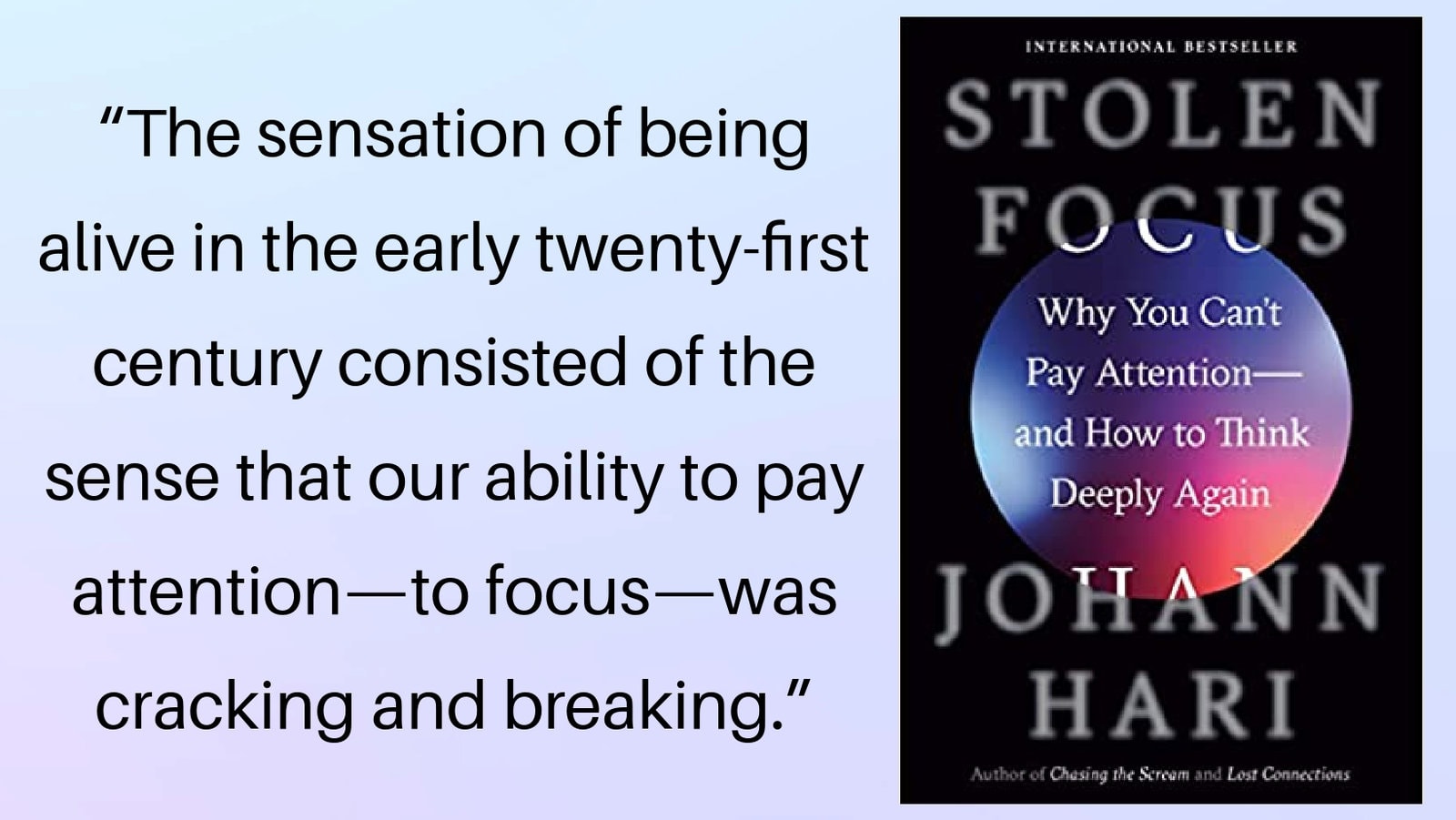
DEVOTIONALS
I have been reading through two 365-day devotionals this year, one in the morning and one each night. I’ve loved the mix of older (Lewis) and newer voices. Though I still have a couple more weeks before I finish these devotionals, I wanted to share them here for those of you looking for devotional recommendations for 2023.
A Year With C.S. Lewis: Daily Readings from His Classic Works: The words of Lewis have been formative for my faith and that of countless others. At the start of this year I was craving steadiness and dependability from my faith readings and knew I would find that in this collection. Each day contains a one-page excerpt from one of Lewis’s works (among them Mere Christianity, The Screwtape Letters, and A Grief Observed). I have read a number of Lewis’s books in full but was thankful for the chance to dip back into his wisdom each morning through this collection, and because Lewis’s writing is so packed with insight, I found the brief excerpts to be more impactful than attempting to reread the entire books. The devotionals are well-arranged and surprisingly timely for reflections written many decades ago. The historical factoids about Lewis included by the editor are a nice touch. This devotional will be appreciated by those new to Lewis and long-time Lewis fans alike. This is right up there with My Utmost for His Highest as my all-time favorite devotionals.
My Rating: 5+ Stars // Book Format: Print
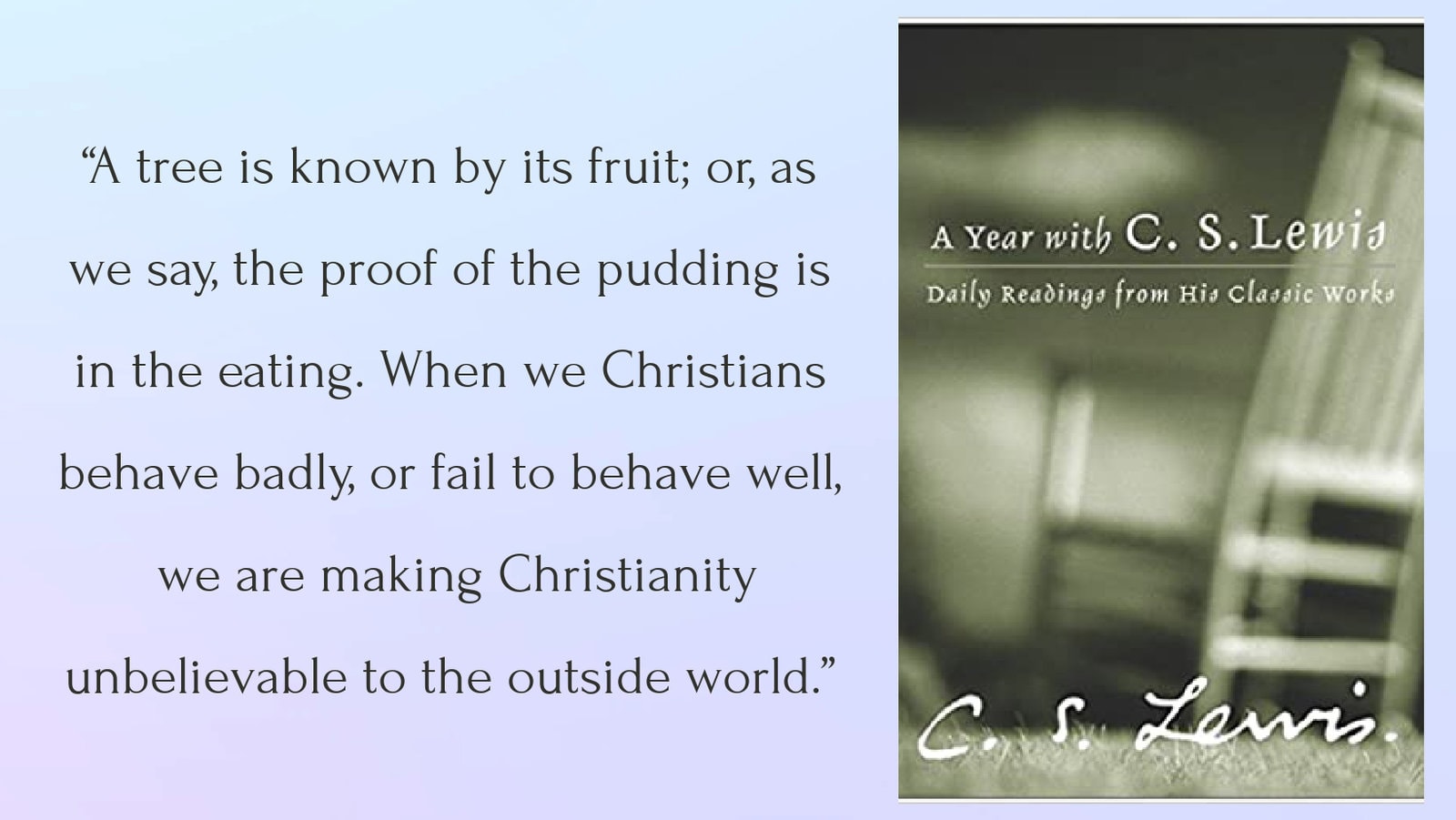
Faith That Matters: 365 Devotions from Classic Christian Leaders This devotional contains essays from some of contemporary Christianity’s most quotable teachers. While I tend to prefer some uniformity in books like these, I found I quite liked the variety of perspectives and topics. Each day begins with a brief passage from Scripture that ties in with the reading, followed by a reflection question and a personal prayer. Some of the essays are stronger than others, with a tendency towards self-help in a few, but overall I enjoyed this collection that spoke to my heart in some unique ways.
My Rating: 4 Stars // Book Format: Kindle
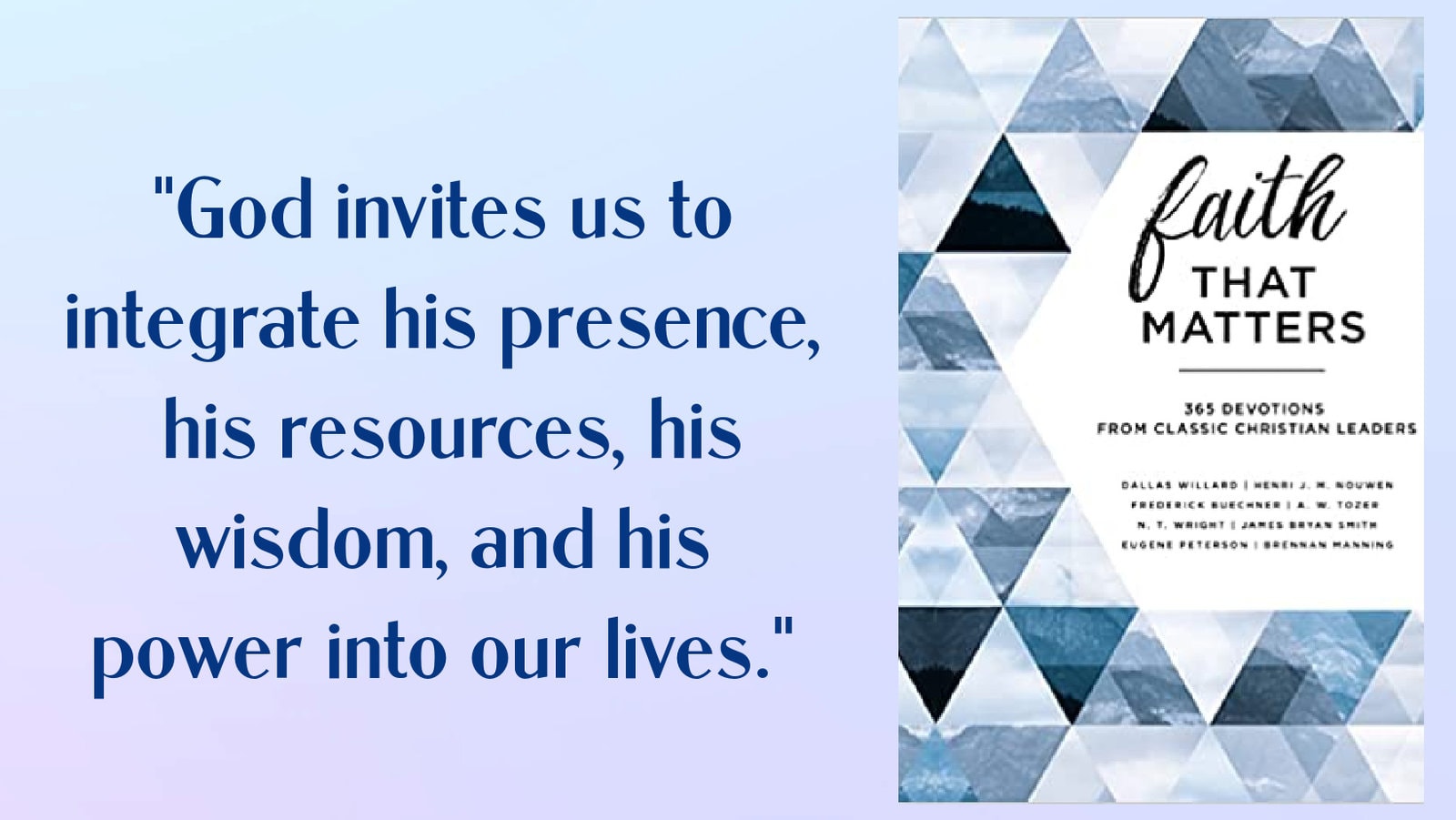
What have you read in the past month? What types of books do you find yourself picking up when life gets busy?